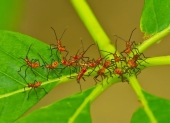




 3
3




"The rule of no realm is mine. But all worthy things that are in peril as the world now stands, these are my care. And for my part, I shall not wholly fail in my task if anything that passes through this night can still grow fairer or bear fruit and flower again in days to come. For I too am a steward. Did you not know?" Gandolf












sonny gonza wrote:thank you for your awesome post, I appreciate it. Still curious about a few things.
what part do the ants play in this drama?
and, I didn't use to have this problem, it just came about out of nowhere, I want to know what the root cause for this is. am I to be blamed for this? too much water, too little maybe?
according to the principals of permaculture, a plant that thrives in ideal conditions will be healthy enough to fend for it self by synthetizing toxic alkaloids into its leaves protecting it from pests, correct? so with this in mind, my plant is not thriving. I'm not as interested in treating the symptoms as I am to figuring out the root cause of the problem to prevent it from ocurring at all.
"The rule of no realm is mine. But all worthy things that are in peril as the world now stands, these are my care. And for my part, I shall not wholly fail in my task if anything that passes through this night can still grow fairer or bear fruit and flower again in days to come. For I too am a steward. Did you not know?" Gandolf





|
Hey, I'm supposed to be the guide! Wait up! No fair! You have the tiny ad!
Learn Permaculture through a little hard work
https://wheaton-labs.com/bootcamp
|




